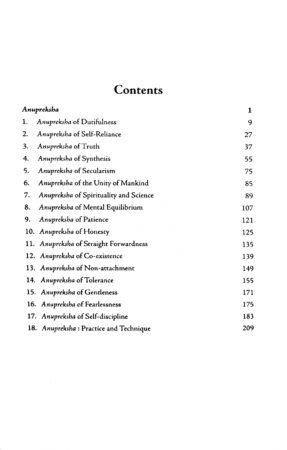
Be What U Want


About the Author
Being a poet along with being a philosopher is a rare combination. Acharyashri Mahapragya is a great poet besides being a great philosopher. The literature written by Acharyashri Mahapragya is proving very effective like panacea in solving the horrible problems of the present age like tension, lack of sensitivity, excitement, depression, terrorism, inferiority complex, hatred, fraud, immorality, lack of authenticity and absence of peace. In the books of Acharya Mahapragya, solutions of various problems have been given by way of experiments and training. His writings bring about an all-round development in one’s life and thus are rendering a great service to the humanity. Mankind will forever be obliged to him for his contribution that he has made through his literature.
About the Book
- How Awareness of Duty in the Youth can lead to Nation Building?
- How Self- exertion is sign of living a moral life?
- What is Truth and truth? Know the meaning of statable truth.
- How to realize the identity of all things around you?
- How sadhna and sect are related?
- How unity is determined by both similarity and dissimilarity in human race?
- The Functioning of Brain Waves and the co-relation between R.N.A. and sadhana.
- How to train the mind to perceive things beyond the range of a gross mind?
- Why the Secret of Sadhna is Patience?
- Straightforwardness- The Way to Purification
- Anekanta and the acceptance of co-existence of the opposites.
- How to practice the Yoga of Non-Attchment?
- What are the techniques to develop Tolerance?
The book is based on the principle of Anupreksha, and through the principle of Anupreksha the book then embarks the reader upon a journey of offering a deep insight into some very intrinsic behaviours of human mind like the need of attention, the cause of fear, the lack of dutifulness, the multi-dimensions of the truth, the sense of “me and mine” causing end of unity, the basics of science and spirituality being co-existent and proportional to each other, the concept of penance for purification and many other realities which read through the pages of this book, create a much concrete understanding of the reader about their own self and rather at every page of the book, the reader gets an opportunity to introspect, self-analyse and also for self-correction.
Anupreksha
Anupreksha, is a part of the preksha mediation. Preksha means dhyan, i.e. perceiving and seeing, which is followed by Anupreksha, i.e. thinking and contemplation on a subject, free from the infatuations of the mind. “Anu” means “afterwards”. Whatever one experience during mediation, is contemplated and meditated about later, is Anupreksha. The practise of Anupreksha in a sense is also about self suggestion-ism. It is the technique of suggesting our minds about a certain subjects in such a way that our mind believes it to be true and commands the body to act accordingly. It has actually been seen that the practise of Anupreksha has caused people to leave their habits like smoking, drinking and has even healed people from some deadly diseases.
On the other, practise of Anupreksha is also very necessary for one to avoid the unreal. It is also about living in the Truth devoid of assumptions, false scenarios and untruth. I believe that in todays world, the power of the modern minds that increased so much that the minds are capable to imagining, perceiving and contemplating the future until that extent where the thinker fears his own existence and therefore acts in a way which is harmful for himself, let alone for the people around him and it is the much-needed practise of Anupreksha, which can come to the rescue of these modern minds. But the most crucial part about adopting the practise of Anupreksha, is to not look at truth with one’s pre-conceptions, prejudices and illusory views. One has to observe the truth, the reality just as the way it is and only that Anspreksha means the contemplation of what is true, of what is real, of the actuality of the moment. Anupreksha thus implies that we say good-bye to our pet notions, our and see only the real, the factual. It is this kind of Anupreksha pre-conceptions which is practised in the technique of Preksha Meditation that we learn to observe the truth without any conceptions obsolete conventions and pre-conditionings.
The 18 Commandments of being the True-Self
- Anupreksha of Dutifulness
- Anupreksha of Self-Reliance
- Anupreksha of Truth
- Anupreksha of Synthesis
- Anupreksha of Secularism
- Anupreksha of the Unity of Mankind
- Anupreksha of Spirituality and Science
- Anupreksha of Mental Equilibrium
- Anupreksha of Patience
- Anupreksha of Honesty
- Anupreksha of Straight Forwardness
- Anupreksha of Co-existence
- Anupreksha of Non-attachment
- Anupreksha of Tolerance
- Anupreksha of Gentleness
- Anupreksha of Fearlessness
- Anupreksha of Self-discipline
- Anupreksha: Practice and Technique
All these 18 commandments, have been written in form of separate chapters, with each chapter being analysed from the perspective of an individual soul, to its effect on a community altogether. Some important points to reflect upon in this book are:
- The concept of dutifulness states that “Duty for the sake of Duty” is a must. It simply means that duty should be for the sake of duty and never out of pity or compassion. It is when duty is born from free will, it has its independent value and carries a constructive value.
- If one is seeking truth, he won’t be able to find it through any institution. He will have to explore the very depths of his soul to achieve the same.
- Fear is born out of doubt. If the sadhak is doubtful about his sadhna then such a situation would fill him with fear and despair.
- The eternal Truth can never be spoken and expressed, it can only be experimented and realized on your own. Therefore Lord Mahavira had said “Seek the truth for yourself”.
- Religion is nothing but the inner purity of the soul. Therefore it is not a matter of belonging to any particular race, class or sect.
- It has been seen that human mind can be influenced through sadhna and through scientific experiments too. Where at one place sadhna needs time and practise, scientific experiments give results faster. However, sadhna works on the root cause whereas the results of the scientific experiments are on temporal basis.
- Both action and thought go together. When the mind is divorced from the action, it leads to unintelligibility and therefore mediation is needed train the mind.
- It is the impatience of the man which acts a hindrance in his path of One should increase one’s practice of patience otherwise the equilibrium of the body is disturbed.
- Honesty is nothing but harmony of thought, speech, and action and contradiction between them is dishonesty.
- A Sanskrit poet has said “The needle is straight and therefore sews things together, creates one fabric out of two pieces. The scissor is crooked; it splits; cuts one piece into two”. Similarly straightforwardness binds the mind together, the scissors of attachment and illusion severs them.
- Fire can be said to be cold and ice can be said to be hot. We cannot view everything only from one point of view. Lord Mahavira said that we cannot propound reality without relativity. Where we expound truth relatively, it naturally leads to co-existence.
- The true meaning of being detached is to undergo self-realization. The way to self-realization is through neutralization of unnatural distortion in every action. He who experiences his true nature as the knower and the seer becomes self-realized.
The man who has control over his emotions, can go very far. The man who cannot fully control his emotions, but has limited capacity and controls his passions to some extent, is able to maintain the status quo. But the man who is a slave to his passions, forces himself into a miserable plight, soon degenerates. Let us realise this truth that without exercising control over emotions, we cannot make any progress in life.
Who shall read this book?
- The practise of Anupreksha
- Awareness of duty in the Youth and its impact on the Nation
- Man and Self-exertion. The need of being dependent on one’s own self
- What is Truth and truth? The difference between the statable and the unstatable
- Recognition of different possibilities: The Secret of Success
- The Science of Living: Modern Day path to the discovery of the Laws of Life
- The co-relation between R.N.A. and sadhna
- The training of the mind towards mental equilibrium
- The secret of meditation: Patience
- Straightforwardness, a symbol of the purified one
- Existence and co-existence, way to peaceful living
- Non-Attachment and the Art of Perceiving
- The consummation of Fearlessness: Veetaraagata (A State of Enlightenment)
Contact Us
Feel free to post your queries, reviews and thoughts to us by writing to us at email@anadiananth.com or by filing out the form provided in the Contact Us page.
Phone No.: 8286000868
Address: 17/2 & 3, Parvati Niwas, Juhu Village, First Floor, Sector – 11, Vashi, Navi Mumbai – 400703 Above Global Pharmacy Shop Near Main Entrance Gate and Opp Shiv Sena Shaka Near Vinamra Swaraj Hospital
@Website Owned by Adv. Lalit K Jain
@ All intellectual Property Rights and Copyright of this Website is Owned by Adv. Lalit K Jain